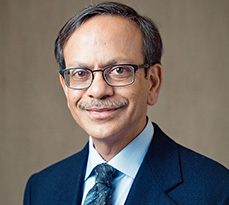In advance of a conference on ‘Doing Business in the Age of Digital Transformation’, Dr Kishore Sengupta, Reader in Operations Management at Cambridge Judge Business School, argues that senior managers must confront digital challenges head-on.


Why should senior managers think hard about “digital transformation”? The simple answer is that they can’t afford not to, because digital has gnawed its way to the very foundation of organisations – changing the way people work, how they interact, even the basic tenets of many businesses and professions.
Digital transformation is blurring lines of business and the lives of people who work for them, changing forever the boundaries of what skilled humans must do and what machines can do just as (or nearly) as well. Digital has eviscerated the distinctions upon which companies built their business model, changing the entire notion of “value creation.” And digital has created new and more efficient ways of doing business in every industry, no matter how resistant to change that industry may once have been.
So the way senior managers manage this huge transformation will define whether organisations are destroyed or reinvigorated in the face of this ubiquitous digital challenge, as digital decisions taken by managers will ultimately determine whether the gnawed-at foundations of their companies crumble or grow stronger.
The 1 November 2016 conference in London organised by the Executive Education division of Cambridge Judge Business School – “Doing Business in the Age of Digital Transformation” – will bring together multiple perspectives on this crucial management issue by examining three key aspects:
- What are the pivotal digital issues in four key sectors of the economy: public services, professional services, healthcare and finance? Senior faculty from Cambridge Judge will present leading-edge research on their findings in these four areas.
- What does this research mean for practitioners in each of these sectors, in terms of how these practitioners think about digital transformation? The conference will examine ways of turning academic findings into concrete steps by companies and other organisations.
- What can managers do to control and shape the forces of digital transformation? This will be explored in three hands-on workshops led by Cambridge Judge faculty: “Transforming your organisational business model,” “Collaboration in an era of digital transformation” and “Business models in an age of digital transformation.” These discussions will then be synthesised, with the results sent later to participants.
A panel discussion involving Cambridge Judge academics and representatives of two very different industries, pharmaceuticals through AstraZeneca and digital banking through Lloyds Banking Group, will examine how digital delivery can boost efficiency while cutting costs.
These various sessions will be framed by the morning and afternoon keynote addresses – on how digital transformation has totally blurred traditional industry boundaries, and how digital transformation has created a new “Circular Economy” in which recycling and reuse have changed the economics of businesses around the world, including such major industries as car-making and computer manufacturing.
One area I will focus on at the conference is how the digital transformation has shaken up professional service firms such as those specialising in law, accountancy and insurance. Put simply, all these professions are facing up to the very uncomfortable intersection of what humans have traditionally done and what machines can now accomplish owing to digital transformation.
People who spent many years in expensive training for the “skilled” professions naturally believe that they possess knowledge, judgment and experience that no digital device could ever equal. But huge advances over the past decade in artificial intelligence and Big Data analysis mean that technology can now accomplish many tasks as well as people – or close enough given the cost differential for clients.
10 years ago, people talked about machines handling the routine transactional work of professions Leap forward to today, however, and machines can now make very good decisions based on machine learning and other new technologies – so the professions’ arguments about “judgment” and “experience” don’t ring as true as they once did.
Leap forward another decade, and I’ll speculate that further digital advances may mean that machines can carry out ever more sophisticated tasks with the caveat that most time-frame predictions involving artificial intelligence have been well off the mark.
As I said previously, all this can be very uncomfortable – including for managers who may have to choose between personal loyalty and efficiency in the wake of the digital transformation sweeping through their organisations and their sectors. But, in the long run, it will likely be more uncomfortable for managers and organisations who simply fail to respond to these enormous digital upheavals.
We hope the 1 November conference will, through the combined insight of academics and practitioners, help senior managers navigate these challenges with greater insight and confidence.

